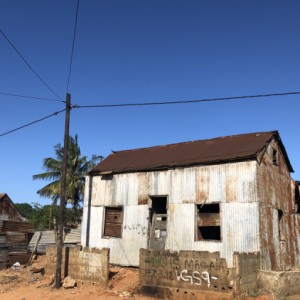Hullo Timothy
Having Timothy to visit is a joy. He is wonderfully malleable and flexible in what he wants to do, so a host’s job is made very easy.
There is a bairro (district) of Maputo called Mafalala. This is known as the birthplace of Mozambican leaders, thinkers and artists and is located on the fringes of the city centre, separated as are other bairros by the arc of Avenida Marien Ngouabi. In the colonial era this avenue acted as the barrier between the ‘Portuguese’ zones of the city and zones where black and mestiço (mixed race) Mozambicans had to reside. It isn’t talked about as an apartheid system but with the passes that black Mozambicans needed to carry to enter central areas of the city, it certainly had similarities with other parts of the region.
A small NGO organises visits to Mafalala. The guide for the walking tour was Ben, born, raised and resident in the bairro. Ben was excellent and thought-provoking company. He wanted to clarify some English language questions with native speakers and we started discussing some big philosophical questions about how residents of Mafalala see themselves. Based on his views, the colonial project was a catastrophic failure in terms of the self-belief of non-European communities. Collective self-worth has been hugely damaged by decades of oppression. Ben believes Africans are innately less intelligent and ‘civilised’ than Europeans and when I returned a pot of nail varnish that had fallen from a vendor’s collection, he said that if a Mozambican had found it, they would have stolen it. His views mirrored the absolute worst racist stereotypes that I’ve seen come out of a minority of European and North American mouths. His evidence is what he sees as the lack of development in Mozambique despite some people now having wealth and power, from sewage systems in Mafalala to corruption in the recent elections, and comparisons of this with the lives and societies of other countries.
The ‘western notion of development’ has been very damaging to how cultures and countries measure themselves. In Mozambique’s case compared to a country such as the UK, it’s objectively true that a smaller proportion of the population has access to good sanitation and that there is greater evidence of illegal electioneering. However Mozambique has had a modern history of only 27 years since the end of colonialism and the subsequent civil war. Before this democratic elections didn’t exist and institutions didn’t work, and people lived within an organised structure of unfair oppression and opportunity, based on the colour of one’s skin. In only this short period, progress has been rapid: a system of democratic elections now chooses leaders, the government functions and the country has recorded economic growth above global averages, especially during the 2000s. It took a country like the UK many centuries to achieve such a status, and that was done without a framework of colonialism and oppression and carefully constructed inequality. Despite my strongest urges, because I didn’t want to destroy the man’s hope, I resisted having a dig at the British landed gentry and the levels of gross inequality that the UK endures with no end of this in sight.
If the UK or USA are seen as beacons of civilisation, which Ben confirmed they are by Mozambicans, it’s a concept that is too simplistic. In Mozambique I’d find it hard to imagine any rally firing up people using claims that men from the neighbouring country are rapists, with half the people present cheering that the man uttering those words is a prophet sent by God. This is not a mark of what people would popularly call civilisation yet is a recent event in the USA.
I hope our discussion made him think and at least start to eliminate the negative rhetoric about his own community. Surely that has to be one of the first steps to encouraging yourself and others to create opportunities and succeed in them.
In the evening I took Tim to a BBQ being organised by my friend Tina, and introduced him to some of Maputo’s eclectic characters.


Comments
Sign in or get an account to comment.


